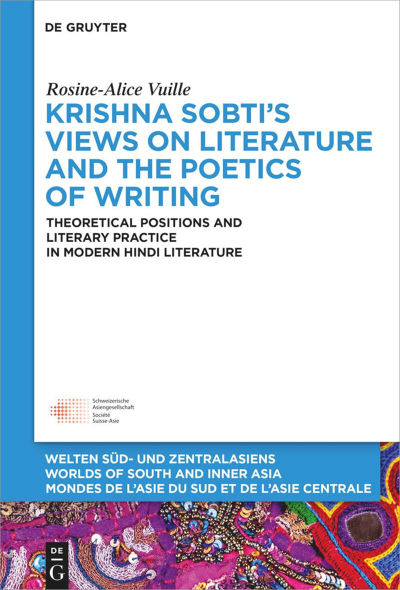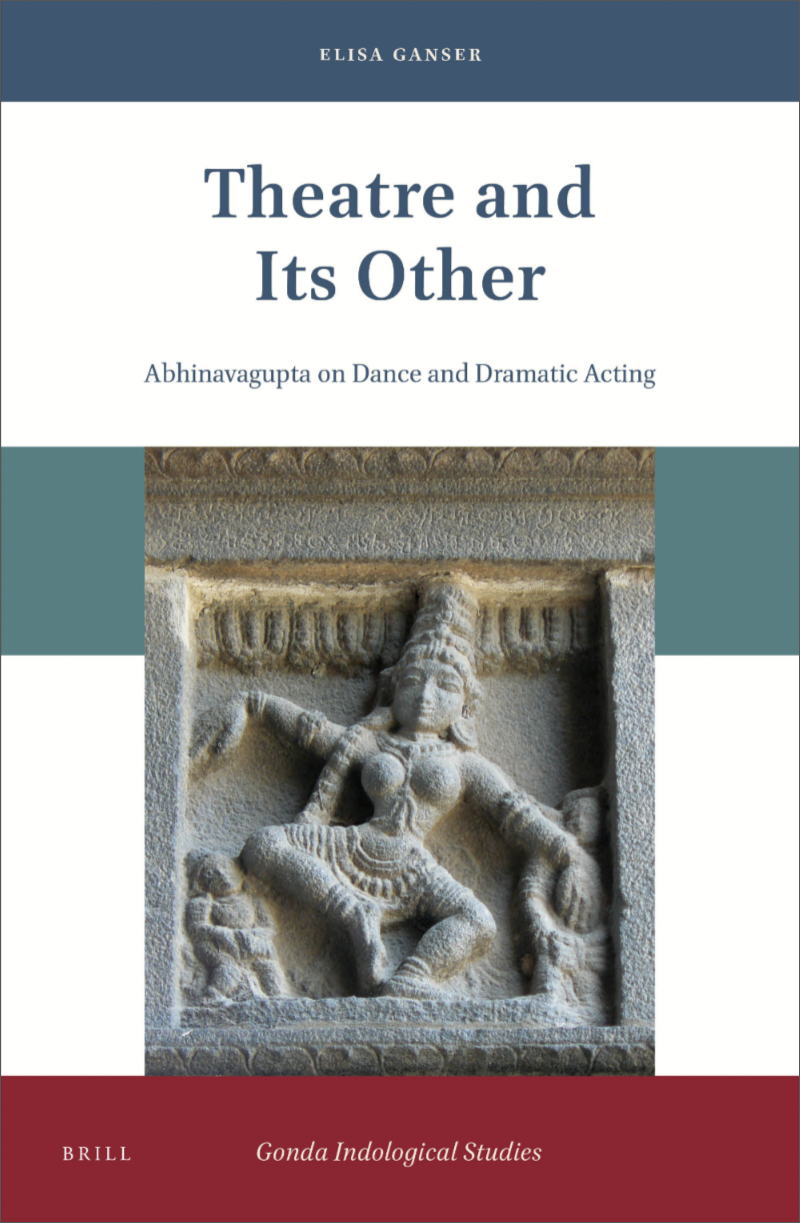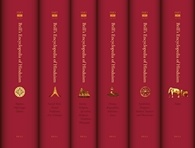Publications

Rosine-Alice Vuille Krishna Sobti’s Views on Literature and the Poetics of Writing: Theoretical Positions and Literary Practice in Modern Hindi Literature. Berlin: De Gruyter, 2022 ( Welten Süd- und Zentralasiens / Worlds of South and Inner Asia / Mondes de l'Asie du Sud et de l'Asie Centrale, 12)
How does a writer discuss her creative process and her views on a writer’s role in society? How do her comments on writing relate to her works? The Hindi writer Krishna Sobti (1925-2019) is known primarily as a novelist. However, she also extensively wrote about her views on the creative process, the figure of the writer, historical writing, and the position of writers within the public sphere. This study is the first to examine in detail the relationship between Sobti’s views on poetics as exposed in her non-fictional texts and her own literary practice. The writer’s self-representation is analysed through her use of metaphors to explain her creative process. Sobti’s construction of the figure of the writer is then put in parallel with her idiosyncratic use of language as a representation of the heterogeneous voices of her characters and with her conception of literature as a space where time and memory can be "held." At the same time, by delving into Sobti’s position in the debate around "women’s writing" (especially through the creation of a male double, the failed writer Hashmat), and into her views on literature and politics, this book also reflects on the literary debates of the post-Independence Hindi literary sphere. To the publisher’s website
Elisa Ganser Theatre and Its Other: Abhinavagupta on Dance and Dramatic Acting. Leiden: Brill, 2022 (Gonda Indological Studies, 23)
What is Dance? What is Theatre? What is the boundary between enacting a character and narrating a story? When does movement become tinted with meaning? And when does beauty shine alone as if with no object? These universal aesthetic questions find a theoretically vibrant and historically informed set of replies in the oeuvre of the eleventh-century Kashmirian author Abhinavagupta. The present book offers the first critical edition, translation, and study of a crucial and lesser known passage of his commentary on the Nāṭyaśāstra, the seminal work of Sanskrit dramaturgy. The nature of dramatic acting and the mimetic power of dance, emotions, and beauty all play a role in Abhinavagupta’s thorough investigation of performance aesthetics, now presented to the modern reader. To the publisher’s website
Knut A. Jacobsen, Helene Basu, Angelika Malinar, Vasudha Narayanan (eds.) Brill's Encyclopedia of Hinduism (6 vols). Leiden: Brill, 2014.
- Volume I: Regions, Pilgrimage, Deities ISBN 978 90 04 17641 6
- Volume II: Sacred Texts, Ritual Traditions, Arts, Concepts ISBN 978 90 04 17893 9
- Volume III: Society, Religious Specialists, Religious Traditions, Philosophy ISBN 978 90 04 17894 6
- Volume IV: Historical Perspectives, Poets/Teachers/Saints, Relation to Other Religions and Traditions, Hinduism and Contemporary Issues ISBN 978 90 04 17895 3
- Volume V: Religious Symbols, Hinduism and Migration, Some Modern Religious Groups and Teachers ISBN 978 90 04 17896 0
- Volume VI: Indices ISBN 978 90 04 17896 0
Complete bibliography
ZORA Publication List
Download Options
Publications
-
2004
-
Malinar, Angelika
-
Körper-Theater und Selbst-Erkenntnis. Konzepte von Erfahrung in der indischen Philosophie Zeitschrift für Ästhetik und allgemeine Kunstwissenschaft, 4:211-231.
-
Completeness through Limitation: On the Classification of tattvas in Sāṃkhya Philosophy Berliner Indologische Studien, 15-17:307-325.
-
Die Ganga: Zwischen Reinheit und Reinigung Wissenschaftsmagazin funidert, 2:64-69.
-
Hinduismus In: Emrich, Ulrike; Baer, Harald . Brockhaus Religionen. Glauben, Riten, Heilige. Mannheim: s.n., 253-256.
-
Text and Context in the History, Literature and Religion of Orissa Edited by: Malinar, Angelika; Beltz, Johannes; Frese, Heiko (2004). New Delhi: Manohar.
-
-
-
2003
-
Malinar, Angelika
-
Indien-Forschung im Zeitwandel: Analysen und Dokumente zur Indologie und Vergleichenden Religionswissenschaft in Tübingen Edited by: Malinar, Angelika; Brückner, Heidrun; Butzenberger, Klaus; Zeller, Gabriele (2003). Tübingen: Attempto.
-
Kṣatriya-Glaube und Opferwesen: Richard Garbe und die indischen Religionen In: Brückner, Heidrun; Butzenberger, Klaus; Malinar, Angelika; Zeller, Gabriele . Indienforschung im Zeitenwandel: Analysen und Dokumente zur Indologie und Religionswissenschaft in Tübingen. Tübingen: Attempto, 121-143.
-
-
-
2002
-
Malinar, Angelika
-
Wiederverkörperung oder Abschied vom Ich: Der Tod und sein Jenseits in der altindischen Literatur In: Assmann, Jan; Trauzettel, Rolf . Tod, Jenseits und Identität : Perspektiven einer kulturwissenschaftlichen Thanatologie. Freiburg: Karl Alber, 764-798.
-
Review of: M. Comans: The Method of Early Advaita Vedānta. A study of Gauḍāpāda, Ṥaṅkara, Sureśvara and Padmapāda Indo-Iranian Journal, 45:145-146.
-
-
-
2001
-
Dalmia, Vasudha
-
Charisma and Canon: Essays on the Religious History of the Indian Subcontinent Edited by: Dalmia, Vasudha; Malinar, Angelika; Christof, Martin (2001). New Delhi: Oxford University Press.
-
-
Malinar, Angelika
-
Rādhāramaṇa Cāraṇa Dās und die Caitanya-Nachfolge in Orissa: Zur Textualisierung von Charisma In: Lönne, Dirk W . Toḥfa-e-Dil. Festschrift für Helmuth Nespital. Reinbek: s.n., 295-313.
-
-
Serbaeva, Olga
-
John Breck. The Power of the Word. St Vladimir's Seminary Press In: Akel'kina, E A; Denisov, S F; Martishina, N I . The Hermeneutics of the Subject. (Germenevtika sub'ekta.). Omsk: Omsk State Pedagogical University Print, 21-52.
-
-
-
1999
-
Malinar, Angelika
-
The Artist as Autobiographer: Ajñeya's Ṥekhar: ek jīvanī In: Dalmia, Vasudha; Damsteegt, Theo . Narrative strategies : essays on South Asian literature and film. Leiden: Oxford University Press, 229-242.
-
Prakṛti as sāmānya Asiatische Studien - Études Asiatiques, 53(3):619-643.
-
-
-
1998
-
Malinar, Angelika
-
Natur-Beweise: Funktion und Interpretation des prakṛti-Begriffs im Sāṃkhya 1998, Universität Tübingen, Faculty of Arts.
-
Review of: W. Doniger (ed.): Purāṇa Perennis. Reciprocity and Trans¬formation in Hindu and Jaina texts Wiener Zeitschrift für die Kunde Süd- und Ostasiens und Archiv für Indische Philosophie, 42:208-211.
-
Mahābhārata In: Radler, Rudolf . Kindlers Neues Literatur Lexikon: Supplement L-Z. München: s.n., 770-772.
-
Wechselseitige Abhängigkeiten und die Hierarchie der Körper. Zum Verhältnis zwischen Tieren und Menschen in hinduistischen Traditionen nach der episch-purāṇischen Literatur In: Münch, Paul . Tiere und Menschen : Geschichte und Aktualität eines prekären Verhältnisses. Paderborn: Verlag Ferdinand Schöningh, 147-177.
-
Zur Einordnung der Göttin Lakṣmī in die Pāñcarātra-Lehren des Lakṣmī-Tantra Zeitschrift der deutschen Morgenländischen Gesellschaft, Suppl.(11):531-542.
-
-
-
1997
-
Malinar, Angelika
-
Review of: Dietmar Rothermund (ed.):Indien. Kultur, Geschichte, Politik, Wirtschaft, Umwelt. Ein Handbuch Orientalische Literaturzeitung, 92(6):743-747.
-
Multiple perspectives and the problem of identity in Ajñeya's Ṥekhar: ek jīvanī In: Bhatti, Anil; Turk, Horst . Kulturelle Identität. Deutsch-indische Kulturkontakte in Literatur, Religion und Politik. Berlin: Erich Schmidt Verlag, 231-251.
-
Inhaltsangabe des Nārāyaṇīya-Abschnittes des Mahābhārata In: Schreiner, Peter . Nārāyaṇīya-Studien. Wiesbaden: Harrassowitz, 379-413.
-
Nārāyaṇa und Kṛṣṇa: Aspekte der Gotteslehre des Nārāyaṇīya im Vergleich zur Bhagavadgītā In: Schreiner, Peter . Studien zum Nārāyaṇīya. Wiesbaden: Harrassowitz, 241-295.
-
-
-
1996
-
Malinar, Angelika
-
Heilige Sprachen: Vedische Religion In: Ueding, Gert . Historisches Wörterbuch der Rhetorik: Band 3: Eup-Hör. Tübingen: Max Niemeyer Verlag, 1332-1334.
-
Gott, Götter und Göttlichkeit in der hinduistischen Tradition des Pāñcarātra Concilium: Internationale Zeitschrift für Theologi, 31(2):96-103.
-
Rājavidyā: Das königliche Wissen um Herrschaft und Verzicht. Studien zur Bhagavadgītā Wiesbaden: Harrassowitz.
-
-
-
1995
-
Malinar, Angelika
-
Review of: David L. Lorenzen: Kabir legends and Ananta-das's Kabir Parachai Wiener Zeitschrift für die Kunde Süd- und Ostasiens und Archiv für Indische Philosophie, 39:271-273.
-
The Bhagavadgītā in the Mahābhārata TV-serial: Domestic drama and dharmic solutions In: Dalmia, Vasudha; von Stietencron, Heinrich . Representing Hinduism. The Construction of Religious Traditions and National Identity. New Delhi: Sage Publications Ltd., 442-467.
-
-
-
1994
-
Malinar, Angelika
-
Die Welten, das Opfer und die Erkenntnis des Selbst im Veda und in den Upaniṣaden In: Resch, Andreas . Die Welt der Weltbilder. Innsbruck: Resch Verlag, 211-242.
-
M. K. Gāndhī und die Frage nach dem Hinduismus RHS-Religionsunterricht an höheren Schulen, 5:268-280.
-
-
-
1992
-
Malinar, Angelika
-
Epic and Purāṇic bibliography : (up to 1985) : annotated and with indexes Edited by: Malinar, Angelika; von Stietencron, Heinrich; Gietz, G-P (1992). Wiesbaden: Harrassowitz.
-
-

